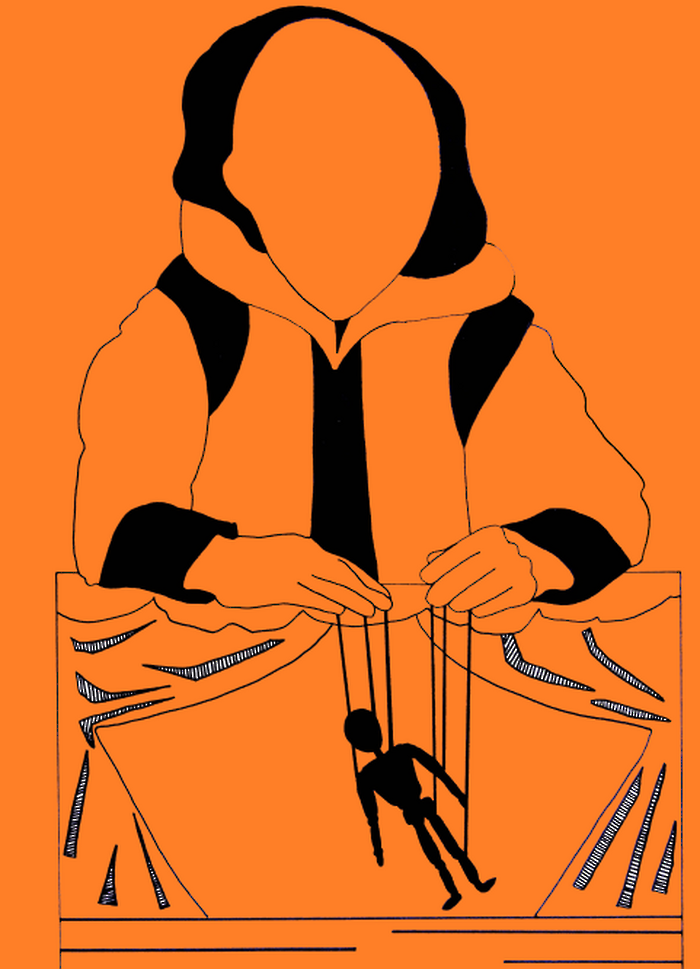The Pillowman review
Despite a somewhat lack-lustre production design, you are in the hands of strong cast who do justice to the depth of the Martin McDonagh’s disturbed characters

This play comes with a content warning, and rightfully so. But I mean this in the best way possible. The Pillowman, written by Martin McDonagh, a master of dark comedy, will have you laughing at and with its characters who tell stories of abuse, torture, and gruesome violence. Do not come expecting pleasant, light-hearted entertainment, but strong, intense performances of disturbingly good fun.
"The play is a puzzle with multiple solutions or perhaps no solution"
The story centres around the case of writer named Kanturian (Alfie Curry), who has been taken into custody by the police force of an unnamed totalitarian regime. Unaware of the crime he has been arrested for, he seems surprised to hear that a recent series of child murders had been inspired by his short stories. The action on stage unfolds in a prison cell and interrogation chamber, in which two detectives, Tupolski (Claire Chung) and Ariel (Sam Tannenbaum), taunt and torture him in order to get to the truth behind this case. Though, in all its wonderful absurdity begging to be made sense of, the play is not an analytic game with any clear moral, psychological or political message, but a puzzle with multiple solutions or perhaps no solution. There is no need over-intellectualize the layers of deceit and interpretative red-herrings. Just be led along the various conflicting currents of storytelling. For everyone has their own stories they wish to tell.
And this is what I enjoyed most about this show: it’s essentially four characters narrating and commenting upon stories, four actors vying to have their voices heard. The first act introduces the detective-thriller cliché of good-cop/bad-cop. But the play comically dismantles the cliché. Chung’s commanding, confidently professional good-cop, with her cold, dead-pan delivery, and Tannenbaum’s bad-cop, with his air of aggression, itching for a physical confrontation, are façades that slowly break down, as they begin to reveal their own personal memories and hopes. The actors successfully navigate the development and depth of their characters, destabilizing the fiction of good-cop/bad-cop, or of hero/villain. The performances work well when characters work with/against each other in pairs. The second pair of characters, Kanturian and his brother, Michal (Alfie Vaughn), a person with a mental or intellectual disability, also being held in custody, conveys a different dynamic. Vaughn endearingly conveys Michal’s childlike view of life, which serves as a foil to the fear and hostility of the world around him. Curry’s portrayal of Kanturian expresses the love and frustration he feels when taking care of his brother. In general, the actors do justice to the complexity of their roles, to both the tenderness and brutality of the play.
A cast this strong would probably be enough to engage an audience, but improvements in the production’s design and tech could really have taken the experience to another level. If you aim to shock the audience, glaring lights and crashing sounds could have been used to much greater effect for the building up and releasing of suspense. Used in conjunction with the confrontations of the performers, the violence so central to the story could have expressed with more force. And I would have liked to see more of what makes the audience wince uncomfortably, but nonetheless captivated: the twisted imagination of Kanturian himself, the dark content of his supposedly childlike fictions. Although it was the right decision not to act out the gruesome stories of torture and murder (on a practical level, that would have required even more fake blood), but the mere narration of his stories did not always shock and unsettle the audience enough. This is but a minor point though, and does not significantly detract from a show carried by vibrant and engaging performances from the cast.
 News / Colleges charge different rents for the same Castle Street accommodation2 March 2026
News / Colleges charge different rents for the same Castle Street accommodation2 March 2026 News / King’s hosts open iftar for Ramadan3 March 2026
News / King’s hosts open iftar for Ramadan3 March 2026 Theatre / Lunatics and leisure centres 4 March 2026
Theatre / Lunatics and leisure centres 4 March 2026 News / Angela Merkel among Cambridge honorary degree nominees27 February 2026
News / Angela Merkel among Cambridge honorary degree nominees27 February 2026 News / News in Brief: waterworks, wine woes, and workplace wins 1 March 2026
News / News in Brief: waterworks, wine woes, and workplace wins 1 March 2026








